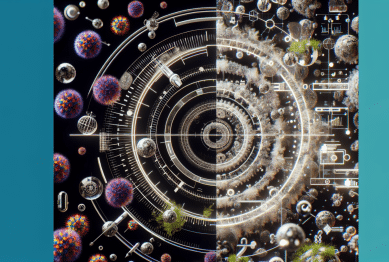Reflection is more than just a tool for self-awareness; it is now being integrated into modern technologies to enhance human cognitive processes. In a time when artificial intelligence (AI) and machine learning dominate various sectors, reflection is making a comeback as a crucial technology that aids in the refinement of thinking patterns and decision-making. This article explores how reflection, which involves thinking deeply about past experiences, is emerging as a thinking technology that plays an essential role in cognitive development, self-improvement, and problem-solving. By integrating this practice into various technologies, individuals and organizations can leverage self-awareness to improve decision-making, creativity, and overall cognitive performance.

Reflection as a Cognitive Tool in Education
In educational contexts, reflection has evolved from a simple self-assessment to a powerful tool for fostering deeper understanding and critical thinking. Many educational systems are now embracing reflective practices, recognizing their role in developing lifelong learning habits. AI-powered learning management systems and digital journaling platforms are incorporating reflection prompts to help students engage more deeply with the material.
Students are encouraged to reflect on what they’ve learned, how they’ve applied the knowledge, and how they can improve. This encourages metacognition—the ability to think about one’s thinking—which is vital for developing problem-solving skills and intellectual independence. Tools like interactive quizzes, online journals, and AI-driven feedback loops allow students to assess their learning in real-time, pinpointing areas where they struggle, tracking progress, and adjusting their approach. Platforms like Evernote and OneNote encourage students to write down thoughts, summarize key lessons, and reflect on experiences, reinforcing their understanding.
Reflection integrated into gamified learning platforms further personalizes the experience. By assessing their progress and setting personal goals, students become more engaged in their learning journey. Schools using these digital reflective tools report improvements in critical thinking, problem-solving, and emotional intelligence, proving reflection’s value in education. This approach enhances not only academic performance but also equips students with the skills needed for intellectual autonomy. The integration of reflection technologies in education supports a more comprehensive, engaging, and personalized learning experience.
Reflection in Decision-Making Technologies
While AI and machine learning can process vast amounts of data quickly, they lack the inherent ability to reflect on that data in the way humans can. This is where reflection comes into play. When humans use advanced decision-making tools that rely on data and algorithms, reflection allows them to consider the broader implications of their decisions. It prompts individuals to think beyond the data and consider their ethical, emotional, and long-term goals.
For instance, in leadership and management decision-making, technologies such as AI-powered analytics platforms allow businesses to track performance metrics and analyze trends in real time. However, reflection allows managers to interpret these results within the broader context of their company’s mission, culture, and values. A manager might analyze sales data, but reflection helps them understand how those sales affect employee morale, customer satisfaction, and the long-term reputation of the company.
Reflection in decision-making also enables organizations to avoid common pitfalls like cognitive biases. By prompting individuals to consider various perspectives and the consequences of their actions, reflection helps foster more objective and balanced decision-making. Technologies that promote reflective practices, such as decision support systems and strategic planning tools, are proving to be valuable assets for organizations looking to improve their problem-solving skills.
Reflection in Mental Health Technologies
Mental health technologies are incorporating reflection to promote self-awareness and emotional regulation among users. Digital tools designed for managing mental health, such as mood-tracking apps, mindfulness platforms, and AI-assisted therapy, now encourage users to reflect on their feelings, thoughts, and behaviors. These tools not only track progress but also guide users through reflective practices, helping them recognize patterns and triggers in their emotional well-being.
For example, Calm and Headspace, popular mindfulness apps, feature daily reflection prompts that ask users to think about their mental state, what caused it, and how they can improve. This reflection fosters greater self-awareness, allowing users to address stressors in a more mindful manner. Furthermore, AI-driven virtual therapists like Woebot prompt users to reflect on their emotions and thoughts during conversations, helping them identify negative patterns and cognitive distortions.
This reflective process is especially important for individuals dealing with chronic stress, anxiety, or depression. By reflecting on their emotional triggers and responses, users can develop healthier coping mechanisms and improve their mental health over time. In some cases, these reflective practices are integrated with biofeedback, where users are prompted to reflect on their physiological responses, such as heart rate or breath patterns, to better manage their emotional states.
The role of reflection in mental health technologies is only growing, with new apps being developed to promote reflection-based exercises like journaling, guided meditation, and self-assessment quizzes. These tools empower users to take an active role in managing their mental health, creating a cycle of self-awareness and improvement that helps them maintain emotional stability.
Reflection in Organizational Innovation and Problem-Solving
Reflection is not just an individual practice; it also has significant implications for organizations looking to innovate and solve complex problems. Companies are increasingly adopting reflective practices to help teams evaluate past performance and identify areas for growth. Reflection is often used in post-mortem analyses or project debriefs, where teams evaluate what worked, what didn’t, and what could be done differently next time.
Reflection helps organizations identify inefficiencies, uncover new insights, and develop a culture of continuous improvement. By encouraging employees to reflect on their work processes and personal contributions, organizations can cultivate a growth mindset, which is key for fostering innovation. Reflection encourages employees to step back from the chaos of day-to-day tasks and take a broader perspective on their roles within the company.
Large tech companies like Google and Microsoft integrate reflection into their innovation processes by requiring teams to assess their successes and failures openly. This not only helps improve performance but also strengthens collaboration by encouraging teams to share ideas and learn from each other’s experiences. The use of reflective tools within organizations—whether through facilitated brainstorming sessions, feedback loops, or AI-powered analytics—helps businesses adapt quickly to changing circumstances and maintain a competitive edge.
Conclusion: The Future of Reflection as a Thinking Technology
Reflection is no longer just an abstract concept but a practical and transformative tool that is shaping the future of cognitive technologies. Whether in education, decision-making, mental health, or organizational innovation, the integration of reflection into these technologies enables individuals and organizations to become more self-aware, informed, and proactive in their approaches to challenges.
As technologies evolve, the future of reflection promises even greater advances. Imagine AI systems that not only process data but also prompt users to reflect on their decision-making, biases, and motivations. The continued development of AI-driven cognitive tools that include reflective practices will likely lead to more ethical, balanced, and thoughtful decision-making across industries. Reflection is no longer just about looking back at past experiences; it is now a dynamic and essential component of thinking technologies that will drive the future of human cognitive development.
References
- Gulddal, J. (2020) ‘That deep underground savage instinct: narratives of sacrifice and retribution in Agatha Christie’s Appointment with Death’ Textual Practice 34(11) pp. 1803-1821. Available at: https://www.tandfonline.com (Accessed: 29 July 2025).
- Thomas, D. and Tian, L. (2021) ‘Hits from the Bong: the impact of recreational marijuana dispensaries on property values’ Regional Science and Urban Economics 87, article number 103655. Available at: https://www.journals.elsevier.com (Accessed: 29 July 2025).
- Abu Salem, H.G., Gemail, K.S., and Nosair, A.M. (2021) ‘A multidisciplinary approach for delineating wastewater flow paths in shallow groundwater aquifers: A case study in the southeastern part of the Nile Delta Egypt’ Journal of Contaminant Hydrology 236, article number 103701. Available at: https://www.journals.elsevier.com (Accessed: 29 July 2025).









